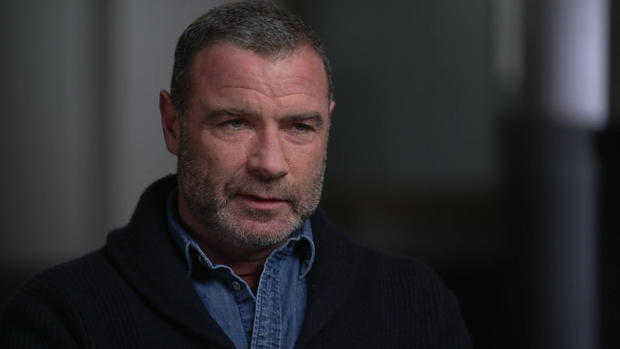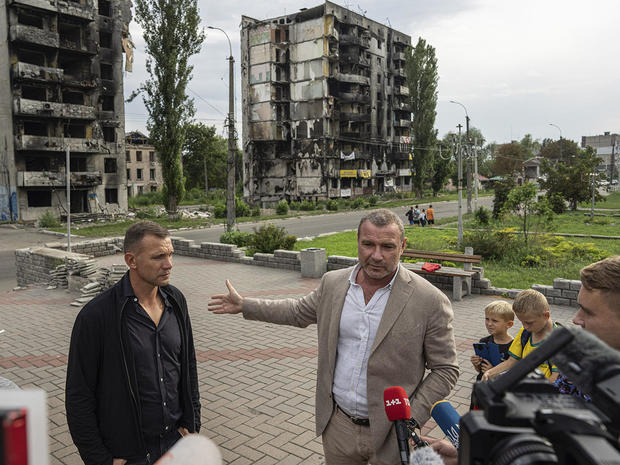Liev Schreiber on becoming an advocate for Ukraine aid: “We’re trying to stop a genocide”
Actor Liev Schreiber has walked many a red carpet. But walking one recently, in Washington, D.C., and working the room as an advocate for Ukraine, felt different. “Ironically, I’m not really good in front of the camera without a script,” he said. “But I’m very grateful that my celebrity has afforded me an opportunity to give something back.”
And giving back for the 55-year-old actor, known for playing Hollywood fixer “Ray Donovan” on CBS’ sister network Showtime, began a year ago, with Russia’s invasion of Ukraine. “I think, like a lot of Americans, I was on my couch watching the war unfold on television,” he said.
When a friend called with an idea – live-stream conversations with Ukrainians from the front – Schreiber was blunt in response: No. “I was in a bad mood and I told them, ‘Look, if you really want to help Ukrainians, just send them some money,’ and hung up,” he recalled. “A couple of guys who have about 30 years of experience in the humanitarian aid world called me back and they said, ‘How serious were you about that idea?’ And I said, ‘What idea?’ And they said, ‘Supporting Ukraine.’
“And it was that moment where I could say yes or no. And I decided that I would say yes and see where it led.”
CBS News
Schreiber’s decision to do something and not just speak out led him to co-found Blue Check Ukraine, which vets and raises funds for non-governmental organizations on the ground. He said, “What was important to us was to make Americans feel safe, to find a way that their dollars could go directly to NGOs on the ground who are doing the work to provide humanitarian aid.”
Schreiber himself visited the country twice last year, and he’s met with President Volodymyr Zelenskyy. But he says his mission isn’t about politics, which he tries to avoid; it’s about the people.
Costa asked, “What have you seen in your trips that people should know about?”
“For me, I think the real moving stuff is meeting the people and just understanding how similar we are and how close we are,” Schreiber replied.
“What do they say to you?”
“They say thank you! Which is also incredibly moving, because I don’t feel like I’ve done anything. And then it compels you to do more, because you want to be deserving of that gratitude.”
Evgeniy Maloletka/AP
And it’s the stories of gratitude Schreiber wants to highlight, like Pavlo Shulga, of the NGO Kidsave, which helped evacuate more than 10,000 women and children in three months last year. During a meeting, Schreiber said, Shulga shared an especially touching moment: “The translator tells me that what Pavlo is saying that the reason he’s so emotional right now is because he heard that this kid had a bake sale and raised $68 selling dog biscuits and sent it directly to him. And he’s just floored by the fact that some little kid in America would care about him.”
Costa asked, “What’s it like to witness courage?”
“There’s a distillation of what’s important in what I see Ukrainians doing every day,” Schreiber said. “I went to meet an extraordinary woman named Iolanta Pryshliak, who runs the Lviv Philharmonic. Overnight, she turned this 70-person orchestra into an aid distribution hub. And I asked Iolanta, ‘What would you say to people who are considering supporting Ukraine?'”
Her response? “‘All we can do is share and love.’ It wasn’t a strategic remark, because I could tell that she had an experience of what was important.”
Costa asked, “For many Americans, it can seem like it’s all over there and it’s a policy debate. But you keep coming back to the humanity of the people there.”
“It is important that we think about this as a humanitarian crisis,” said Schreiber. “We’re trying to stop a genocide.”
Schreiber’s passion stems partially from his own family’s history; his grandfather emigrated from Ukraine. Schreiber also wrote and directed “Everything Is Illuminated,” where the central character visits the country in search of his ancestral ties.
When asked what drives his interest in his roots, Schreiber said, “I think it has more to do with my sense of what it is to be American than what it is to be Ukrainian. Our democracy, our system of governance is one that I’m hugely proud of. And that’s why I think it’s so important that we continue to support, to be aware of what’s happening in Ukraine.”
Costa asked, “A year in, you’re as involved as anyone in activism and awareness in this issue; are Americans aware enough of what’s happening?”
“I hope so. I think every little bit helps. I think, you know, if you stop to think about, You’re not having any impact, what’s the point?”
“Are you hopeful?”
“I am very hopeful. In fact, I’m convinced they’re going to win.”
“What gives you that conviction?”
“Truth,” Schreiber replied. “You know, the truth is on their side.”
For more info:
Story produced by Kay Lim and Julie Kracov. Editor: Mike Levine.
More on the war in Ukraine:
See also:
For all the latest Automobiles News Click Here
For the latest news and updates, follow us on Google News.



